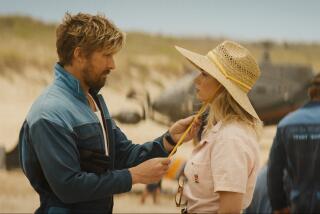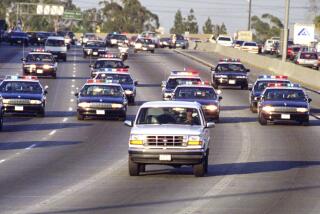MOVIE REVIEW : THIS CHASE IS ON AS THE FREEWHEELING REPORTER, ‘FLETCH’
- Share via
Most of Chevy Chase’s movies have sorely tried the loyalties of his old fans, those who go back to “Saturday Night Live.” So “Fletch” (citywide) will come as good news to all those parched Chevy-ites.
Good, not great. “Fletch” is several degrees less than perfect, yet we’re in such a season of drought that the temptation is to seize on anything not actually endangering public health, sanity or morals and canonize it. In the hands of director Michael Ritchie, “Fletch” is smart, dead-pan dry and funny--most of the time, when it’s not being faintly superior.
The fun comes from the sonar ping of the dialogue when Chase--as investigative newspaper reporter I. M. Fletcher--encounters people and situations and bounces his delicate depth charges off them. “Fletch,” the novel, a staple with detective-genre fans, is by Gregory Mcdonald; it’s been adapted with nice faithfulness to the language by screenwriter Andrew Bergman.
However, “Fletch” also has (yawn) yet another reworking of the high-speed freeway car chase; a whopper of a fall from taste in one of Fletch’s extemporaneous spiels, this one involving syphilis; a view of most of its peripheral characters that’s condescending and a view of the workings of a metropolitan daily newspaper that’s either out of “The Front Page” or “Superman.”
The plot plants Fletch in derelict disguise on the trail of high-level drug traffic headquartered on the Santa Monica beaches. While his newspaper editor (the splendid Richard Libertini, richly wasted here) chews his nails waiting for Fletch’s city-shaking revelations, a second plot strand surfaces.
A rich young Bel-Air businessman (Tim Matheson), believing Fletch to be a true lost soul, offers him a handsome sum in exchange for one tricky service--murder. And so the story goes galumphing off.
It’s of very little consequence, actually: What it’s really there for is to allow Chase multiple bizarre identities as he uncovers an intricate web of chicanery. Whirling smoothly (and resourcefully--that’s the real delight) from beach rat to surgeon to Afro’d pro basketball star to blue-collared airplane mechanic, Chase is almost entirely unflappable. What flaps he has are nice, like his anguished gargle as he spots M. Emmet Walsh, the doctor who just examined him. Since Chase himself is now masquerading as a visiting surgeon, it’s a dicey moment.
The woman in the case is Matheson’s rich, pretty wife (Dana Wheeler-Nicholson), whom we first see at their club, cheerfully and haphazardly defending herself with a tennis racquet against an automatic ball-dispenser. Wheeler-Nicholson is a puzzling actress--she has the faint air of someone who’s just stepped off a Rose Bowl float to give this acting thing a whirl, yet she’s also quite endearing.
Chase seems to have mellowed; the smug aura that used to surround him has cracked and the man underneath seems . . . humbled may not be quite the word; humorously friendly is probably closer. Geena Davis, as Chase’s always-available researcher-pal at the newspaper, is sunnily outstanding (she was Dustin Hoffman’s dressing-room mate in “Tootsie”).
There’s a wealth of detail to Boris Leven’s production design--places like Fletch’s memento-cluttered apartment, which has all the charm of a well-used hamster cage--that gives the film a tang of reality.
At the same time, there’s a slightly snide undertone to “Fletch” that may put off some members of its audience. The attitude abounds in other Ritchie films (“Smile,” “Semi Tough”) as well: a delight in making fun of those not in the know.
Hand in hand with Fletch’s identities are his roll call of names: Igor Stravinsky, G. Gordon Liddy, Ted Nugent, and more. We get to smile smugly--we know them, of course; it’s the movie’s poor saps who’ve never heard of them. It’s a view of others that audiences may not be quite as comfortable with as “Fletch’s” film makers.
More to Read
Only good movies
Get the Indie Focus newsletter, Mark Olsen's weekly guide to the world of cinema.
You may occasionally receive promotional content from the Los Angeles Times.










